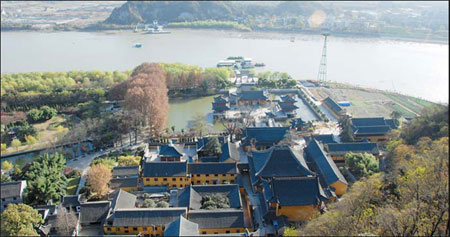A happy homecoming
|
Standing on the Jinshan Hill, visitors can take in a good bird's-eye view of Zhenjiang. Linda Yu |
Although it was very late at night when we rolled into Zhenjiang, Jiangsu province, I anxiously sat up and peered out the car's back window, waiting for something to catch my eye.
As we paused for traffic lights on our way into town, bright KFC signs stood out against the backdrop of closed shops and businesses. The scene depicted nothing unusual among China's developing eastern cities - but it was all new to me.
Like many Canadian-born Chinese, I have come to China partly in search of my roots, and this was my first glimpse at my grandparents' hometown.
Because my family history stretches from Canada to Hong Kong and the Chinese mainland, Zhenjiang is a place I have longed to visit. It's also where my great ancestor Yu Baichuan helped shape the city's proud history.
My cousin, or my grandfather's older brother's grandson on my father's side, was taking me to see our ancestral homeland and meet family there.
Departing from my cousin's hometown Shanghai with his fiance, we took the highway about 200 km northwest to Zhenjiang. Situated on the southern banks of the Yangtze River, the city today serves as one of China's busiest ports for domestic commerce.
We awoke early the next morning to pick up my aunt and great-uncle before heading to the Xijin Ferry Historical Street Block. Located near the former British consulate, the historical block was formed during the Three Kingdoms period (AD 220-280).
The site now contains more than a dozen protected cultural relics, but it's most significant as the birthplace of the world's first charitable maritime lifesaving organization. Xijin Ferry operators established the organization in the Qiandao period of the Southern Song Dynasty (1127-1279).
It was later formalized as the Ferry and Lifesaving Association of Zhenjiang under Emperor Kangxi during the Qing Dynasty (1644-1911).
The lifesaving society evolved from humble beginnings. Buddhist monks would set red boats along the Yangtze River for those caught in the powerful waves and currents that had caused numerous shipwrecks and casualties.
While the rescue tally remains unknown, the organization was responsible for saving countless people, historians say.
By 1872, charitable ferry operations in Zhenjiang relied on donations from four local businessmen and the municipal government, which negotiated funding from five major trade groups to support it.
When funding fell short the following year, my great ancestor was asked to manage the Charitable Ferry Bureau.
Historians refer to Yu as "an intelligent and generous man, whose innovative planning ensured the continuation of the charitable lifesaving organization from the end of the 19th century until the founding of the People's Republic of China in 1949".
To keep the operation afloat for more than 70 years, Yu, who worked in real estate, set aside property and used annual land revenues to fund Zhenjiang's lifesaving operations.
A researcher of the city's history emphasizes how innovative the concept was, as Yu was able to sustain the city's lifesaving operations year after year by "providing new blood".
I asked my cousin if he agreed and immediately sensed his excitement.
"It's not just donating money," my cousin told me, gesturing enthusiastically.
"Using land and taking revenue from it to sustain operations is really an innovative idea."
He says our family is proud of our great ancestor - and so is he.
"He had a good heart for the needy," my cousin said.
"He should be remembered, and his efforts should be respected."
I also felt proud. Actually, it was more than that.
A mix of emotions ran through me that day as I walked through the museum, climbed the steps and stood where my great ancestor's story was etched on a board on the far wall.
At first, awe rushed over me, and I felt near disbelief at the reality of it all.
Then, there was a moment of wonder, with me imagining what it would have been like to live with Yu back then.
Next came a tinge of regret for never having shared the same lifetime as him.
And finally, I felt proud of the family I belong to - for its past, present and future.
And while I was elated to be with my family in the city, it's difficult to describe exactly how I felt in Zhenjiang - a home from which I am nearly two generations removed, mine by ancestry but not by birth.
But something felt both strangely right and peculiarly comforting.
Maybe it was the warm welcome of family, the endearing way my aunts laughed and insisted I resembled my cousin smiling.
Perhaps it was my instant love for Zhenjiang's tasty specialties, including its famous vinegars, special noodles, cold pork and soup dumplings.
It might have been the energy of the streets, the way the shops stacked up against one another.
Or perhaps it was the peaceful calm atop Jinshan Hill, where one can escape traffic to overlook the city.
Whatever it was, it was definitely a feeling that leaves me cherishing my first trip home - and wondering when I will return.
(China Daily 01/12/2009 page10)















